AMON501: Organizational & Bio-Cultural Relations in New Zealand
VerifiedAdded on 2023/06/11
|12
|2785
|211
Report
AI Summary
This report examines organizational and bio-cultural relations within the New Zealand business context, focusing on the significance of the Treaty of Waitangi and its impact on business operations. It discusses the history and articles of the Treaty, its influence on current legislation and the business environment, and the importance of incorporating values like Rangatiratanga and Manaakitanga into business culture. The report also analyzes aspects of policy addressing bi-cultural partnerships, potential policy improvements, and the application of Treaty principles to Naturally Wood, a case study company. Furthermore, it includes a business plan outline for engaging with local iwi and a reflection on attending a Mihi Whakatau, highlighting the importance of cultural understanding and communication. This document is available on Desklib, a platform offering study tools and resources for students.
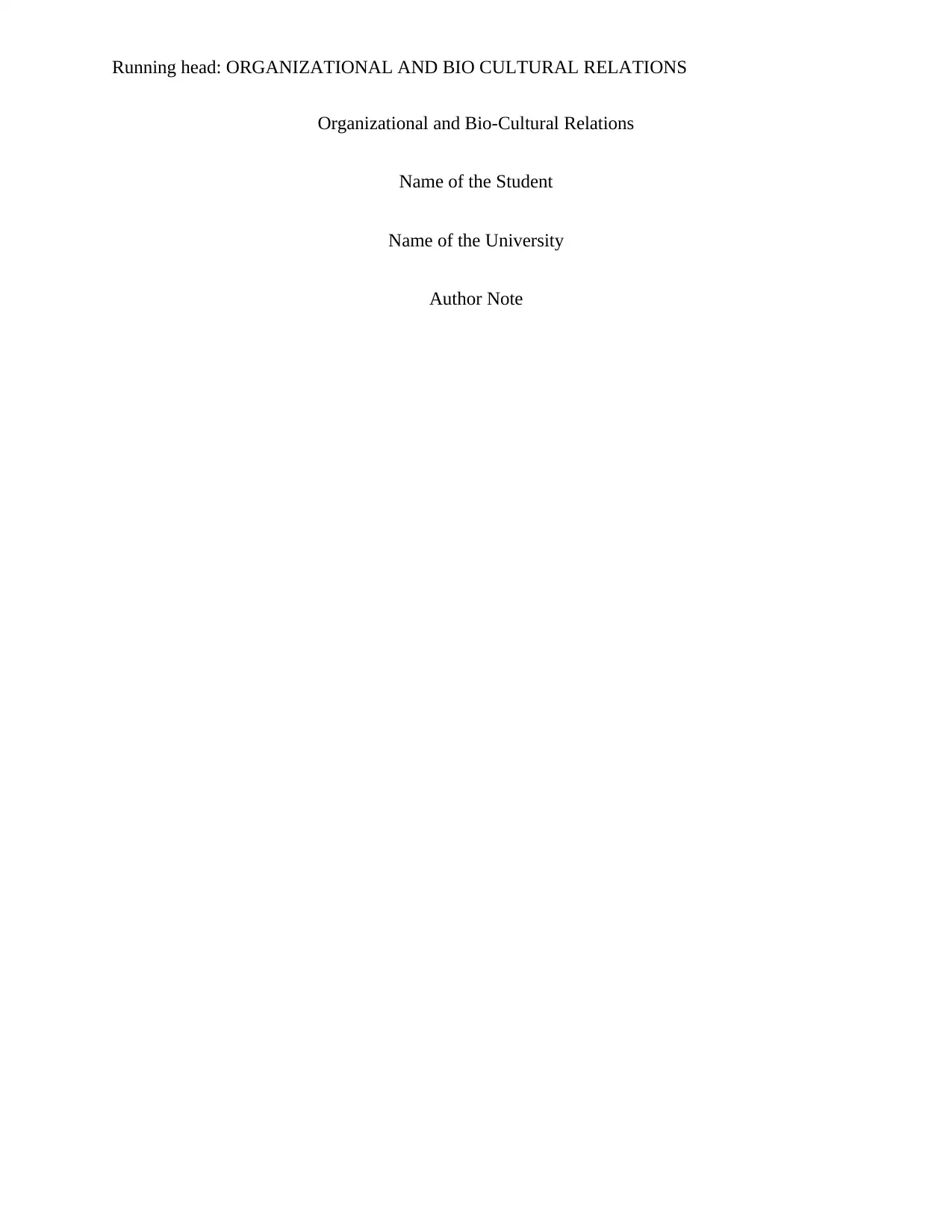
Running head: ORGANIZATIONAL AND BIO CULTURAL RELATIONS
Organizational and Bio-Cultural Relations
Name of the Student
Name of the University
Author Note
Organizational and Bio-Cultural Relations
Name of the Student
Name of the University
Author Note
Paraphrase This Document
Need a fresh take? Get an instant paraphrase of this document with our AI Paraphraser
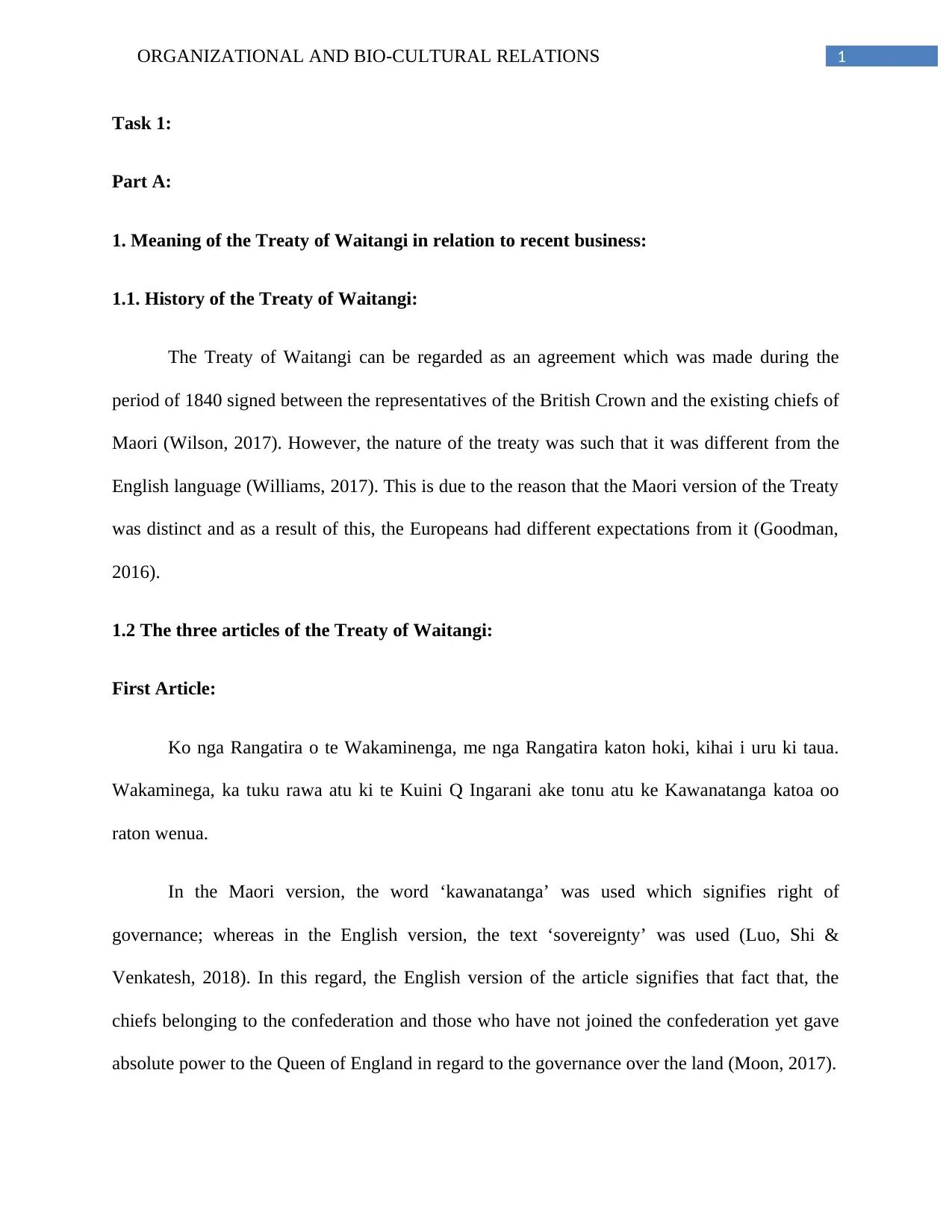
1ORGANIZATIONAL AND BIO-CULTURAL RELATIONS
Task 1:
Part A:
1. Meaning of the Treaty of Waitangi in relation to recent business:
1.1. History of the Treaty of Waitangi:
The Treaty of Waitangi can be regarded as an agreement which was made during the
period of 1840 signed between the representatives of the British Crown and the existing chiefs of
Maori (Wilson, 2017). However, the nature of the treaty was such that it was different from the
English language (Williams, 2017). This is due to the reason that the Maori version of the Treaty
was distinct and as a result of this, the Europeans had different expectations from it (Goodman,
2016).
1.2 The three articles of the Treaty of Waitangi:
First Article:
Ko nga Rangatira o te Wakaminenga, me nga Rangatira katon hoki, kihai i uru ki taua.
Wakaminega, ka tuku rawa atu ki te Kuini Q Ingarani ake tonu atu ke Kawanatanga katoa oo
raton wenua.
In the Maori version, the word ‘kawanatanga’ was used which signifies right of
governance; whereas in the English version, the text ‘sovereignty’ was used (Luo, Shi &
Venkatesh, 2018). In this regard, the English version of the article signifies that fact that, the
chiefs belonging to the confederation and those who have not joined the confederation yet gave
absolute power to the Queen of England in regard to the governance over the land (Moon, 2017).
Task 1:
Part A:
1. Meaning of the Treaty of Waitangi in relation to recent business:
1.1. History of the Treaty of Waitangi:
The Treaty of Waitangi can be regarded as an agreement which was made during the
period of 1840 signed between the representatives of the British Crown and the existing chiefs of
Maori (Wilson, 2017). However, the nature of the treaty was such that it was different from the
English language (Williams, 2017). This is due to the reason that the Maori version of the Treaty
was distinct and as a result of this, the Europeans had different expectations from it (Goodman,
2016).
1.2 The three articles of the Treaty of Waitangi:
First Article:
Ko nga Rangatira o te Wakaminenga, me nga Rangatira katon hoki, kihai i uru ki taua.
Wakaminega, ka tuku rawa atu ki te Kuini Q Ingarani ake tonu atu ke Kawanatanga katoa oo
raton wenua.
In the Maori version, the word ‘kawanatanga’ was used which signifies right of
governance; whereas in the English version, the text ‘sovereignty’ was used (Luo, Shi &
Venkatesh, 2018). In this regard, the English version of the article signifies that fact that, the
chiefs belonging to the confederation and those who have not joined the confederation yet gave
absolute power to the Queen of England in regard to the governance over the land (Moon, 2017).
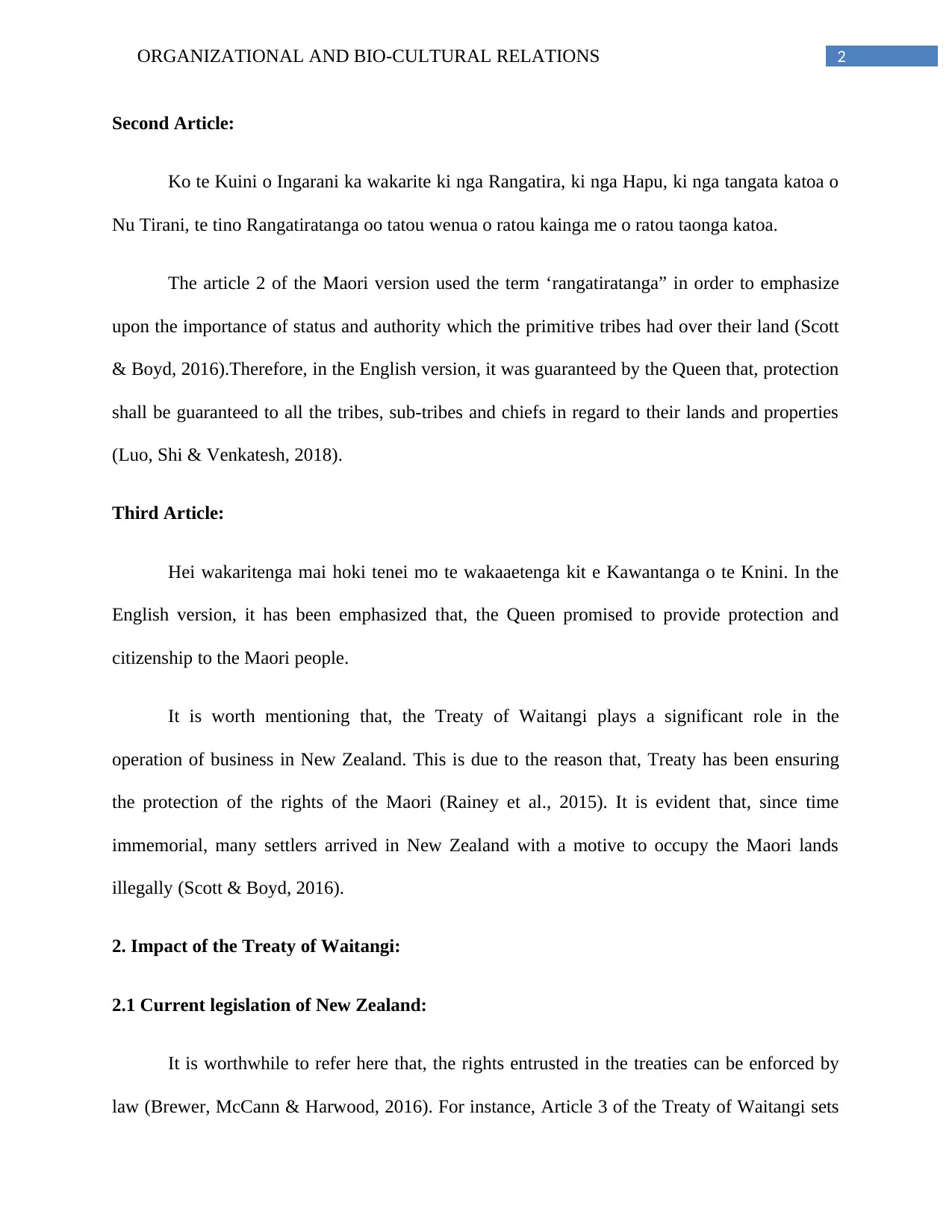
2ORGANIZATIONAL AND BIO-CULTURAL RELATIONS
Second Article:
Ko te Kuini o Ingarani ka wakarite ki nga Rangatira, ki nga Hapu, ki nga tangata katoa o
Nu Tirani, te tino Rangatiratanga oo tatou wenua o ratou kainga me o ratou taonga katoa.
The article 2 of the Maori version used the term ‘rangatiratanga” in order to emphasize
upon the importance of status and authority which the primitive tribes had over their land (Scott
& Boyd, 2016).Therefore, in the English version, it was guaranteed by the Queen that, protection
shall be guaranteed to all the tribes, sub-tribes and chiefs in regard to their lands and properties
(Luo, Shi & Venkatesh, 2018).
Third Article:
Hei wakaritenga mai hoki tenei mo te wakaaetenga kit e Kawantanga o te Knini. In the
English version, it has been emphasized that, the Queen promised to provide protection and
citizenship to the Maori people.
It is worth mentioning that, the Treaty of Waitangi plays a significant role in the
operation of business in New Zealand. This is due to the reason that, Treaty has been ensuring
the protection of the rights of the Maori (Rainey et al., 2015). It is evident that, since time
immemorial, many settlers arrived in New Zealand with a motive to occupy the Maori lands
illegally (Scott & Boyd, 2016).
2. Impact of the Treaty of Waitangi:
2.1 Current legislation of New Zealand:
It is worthwhile to refer here that, the rights entrusted in the treaties can be enforced by
law (Brewer, McCann & Harwood, 2016). For instance, Article 3 of the Treaty of Waitangi sets
Second Article:
Ko te Kuini o Ingarani ka wakarite ki nga Rangatira, ki nga Hapu, ki nga tangata katoa o
Nu Tirani, te tino Rangatiratanga oo tatou wenua o ratou kainga me o ratou taonga katoa.
The article 2 of the Maori version used the term ‘rangatiratanga” in order to emphasize
upon the importance of status and authority which the primitive tribes had over their land (Scott
& Boyd, 2016).Therefore, in the English version, it was guaranteed by the Queen that, protection
shall be guaranteed to all the tribes, sub-tribes and chiefs in regard to their lands and properties
(Luo, Shi & Venkatesh, 2018).
Third Article:
Hei wakaritenga mai hoki tenei mo te wakaaetenga kit e Kawantanga o te Knini. In the
English version, it has been emphasized that, the Queen promised to provide protection and
citizenship to the Maori people.
It is worth mentioning that, the Treaty of Waitangi plays a significant role in the
operation of business in New Zealand. This is due to the reason that, Treaty has been ensuring
the protection of the rights of the Maori (Rainey et al., 2015). It is evident that, since time
immemorial, many settlers arrived in New Zealand with a motive to occupy the Maori lands
illegally (Scott & Boyd, 2016).
2. Impact of the Treaty of Waitangi:
2.1 Current legislation of New Zealand:
It is worthwhile to refer here that, the rights entrusted in the treaties can be enforced by
law (Brewer, McCann & Harwood, 2016). For instance, Article 3 of the Treaty of Waitangi sets
⊘ This is a preview!⊘
Do you want full access?
Subscribe today to unlock all pages.

Trusted by 1+ million students worldwide
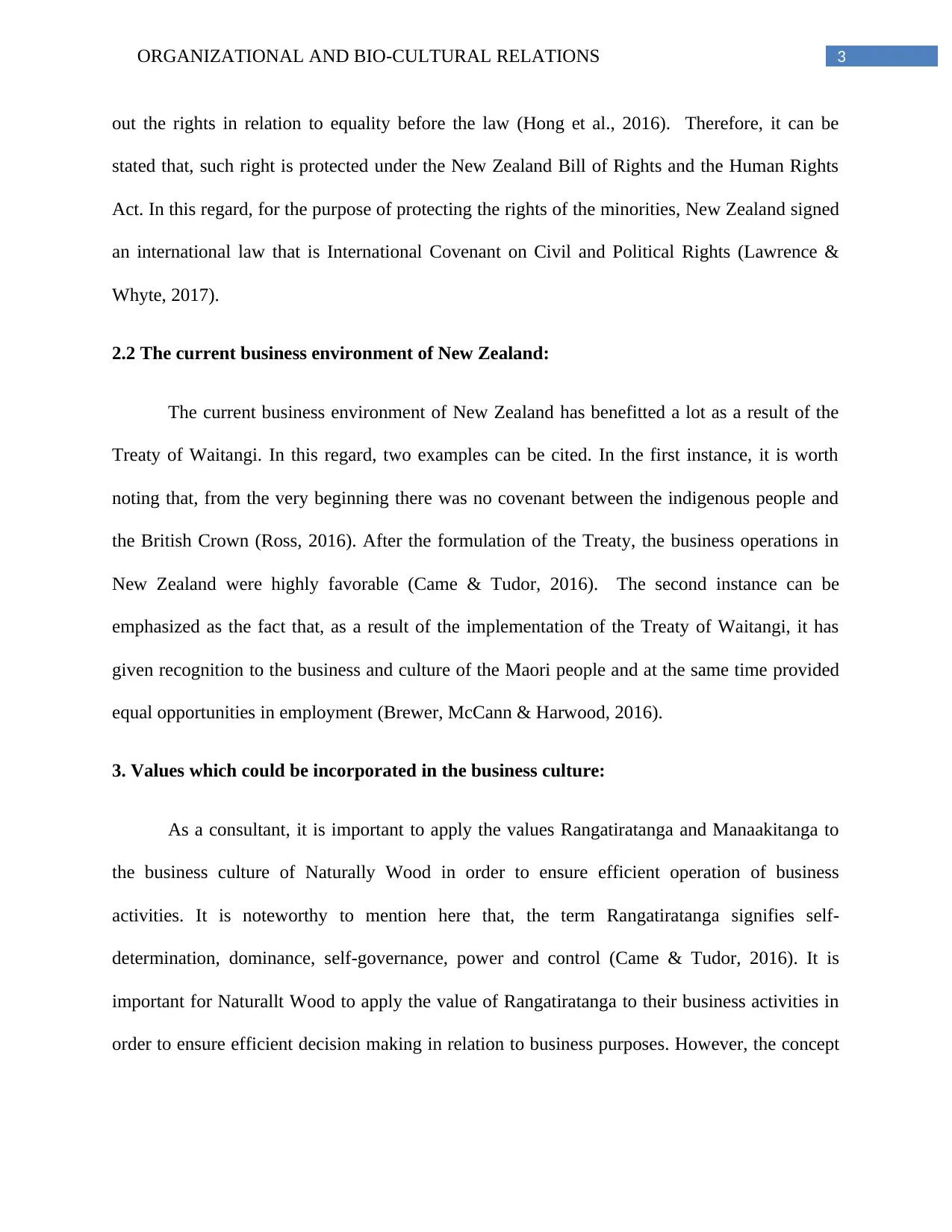
3ORGANIZATIONAL AND BIO-CULTURAL RELATIONS
out the rights in relation to equality before the law (Hong et al., 2016). Therefore, it can be
stated that, such right is protected under the New Zealand Bill of Rights and the Human Rights
Act. In this regard, for the purpose of protecting the rights of the minorities, New Zealand signed
an international law that is International Covenant on Civil and Political Rights (Lawrence &
Whyte, 2017).
2.2 The current business environment of New Zealand:
The current business environment of New Zealand has benefitted a lot as a result of the
Treaty of Waitangi. In this regard, two examples can be cited. In the first instance, it is worth
noting that, from the very beginning there was no covenant between the indigenous people and
the British Crown (Ross, 2016). After the formulation of the Treaty, the business operations in
New Zealand were highly favorable (Came & Tudor, 2016). The second instance can be
emphasized as the fact that, as a result of the implementation of the Treaty of Waitangi, it has
given recognition to the business and culture of the Maori people and at the same time provided
equal opportunities in employment (Brewer, McCann & Harwood, 2016).
3. Values which could be incorporated in the business culture:
As a consultant, it is important to apply the values Rangatiratanga and Manaakitanga to
the business culture of Naturally Wood in order to ensure efficient operation of business
activities. It is noteworthy to mention here that, the term Rangatiratanga signifies self-
determination, dominance, self-governance, power and control (Came & Tudor, 2016). It is
important for Naturallt Wood to apply the value of Rangatiratanga to their business activities in
order to ensure efficient decision making in relation to business purposes. However, the concept
out the rights in relation to equality before the law (Hong et al., 2016). Therefore, it can be
stated that, such right is protected under the New Zealand Bill of Rights and the Human Rights
Act. In this regard, for the purpose of protecting the rights of the minorities, New Zealand signed
an international law that is International Covenant on Civil and Political Rights (Lawrence &
Whyte, 2017).
2.2 The current business environment of New Zealand:
The current business environment of New Zealand has benefitted a lot as a result of the
Treaty of Waitangi. In this regard, two examples can be cited. In the first instance, it is worth
noting that, from the very beginning there was no covenant between the indigenous people and
the British Crown (Ross, 2016). After the formulation of the Treaty, the business operations in
New Zealand were highly favorable (Came & Tudor, 2016). The second instance can be
emphasized as the fact that, as a result of the implementation of the Treaty of Waitangi, it has
given recognition to the business and culture of the Maori people and at the same time provided
equal opportunities in employment (Brewer, McCann & Harwood, 2016).
3. Values which could be incorporated in the business culture:
As a consultant, it is important to apply the values Rangatiratanga and Manaakitanga to
the business culture of Naturally Wood in order to ensure efficient operation of business
activities. It is noteworthy to mention here that, the term Rangatiratanga signifies self-
determination, dominance, self-governance, power and control (Came & Tudor, 2016). It is
important for Naturallt Wood to apply the value of Rangatiratanga to their business activities in
order to ensure efficient decision making in relation to business purposes. However, the concept
Paraphrase This Document
Need a fresh take? Get an instant paraphrase of this document with our AI Paraphraser
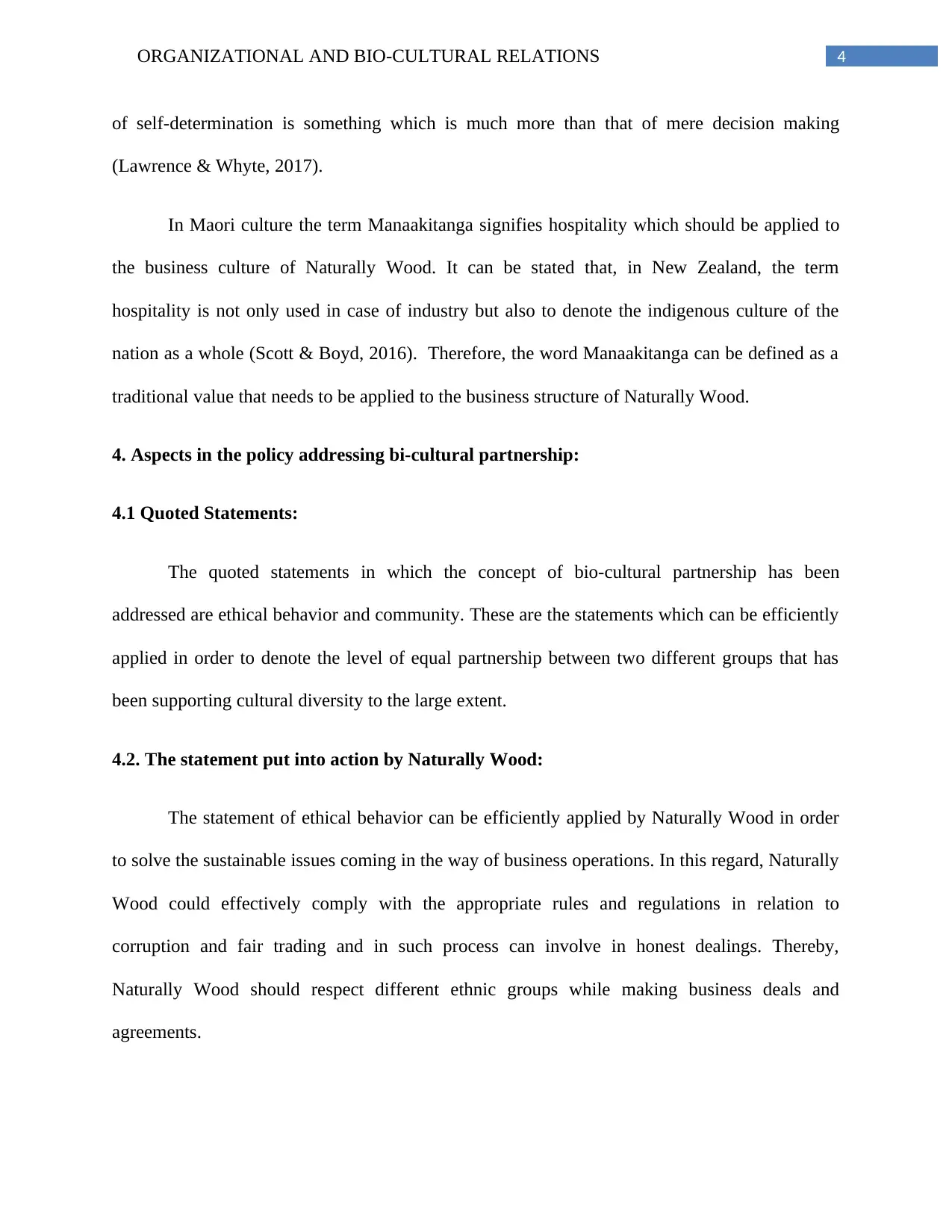
4ORGANIZATIONAL AND BIO-CULTURAL RELATIONS
of self-determination is something which is much more than that of mere decision making
(Lawrence & Whyte, 2017).
In Maori culture the term Manaakitanga signifies hospitality which should be applied to
the business culture of Naturally Wood. It can be stated that, in New Zealand, the term
hospitality is not only used in case of industry but also to denote the indigenous culture of the
nation as a whole (Scott & Boyd, 2016). Therefore, the word Manaakitanga can be defined as a
traditional value that needs to be applied to the business structure of Naturally Wood.
4. Aspects in the policy addressing bi-cultural partnership:
4.1 Quoted Statements:
The quoted statements in which the concept of bio-cultural partnership has been
addressed are ethical behavior and community. These are the statements which can be efficiently
applied in order to denote the level of equal partnership between two different groups that has
been supporting cultural diversity to the large extent.
4.2. The statement put into action by Naturally Wood:
The statement of ethical behavior can be efficiently applied by Naturally Wood in order
to solve the sustainable issues coming in the way of business operations. In this regard, Naturally
Wood could effectively comply with the appropriate rules and regulations in relation to
corruption and fair trading and in such process can involve in honest dealings. Thereby,
Naturally Wood should respect different ethnic groups while making business deals and
agreements.
of self-determination is something which is much more than that of mere decision making
(Lawrence & Whyte, 2017).
In Maori culture the term Manaakitanga signifies hospitality which should be applied to
the business culture of Naturally Wood. It can be stated that, in New Zealand, the term
hospitality is not only used in case of industry but also to denote the indigenous culture of the
nation as a whole (Scott & Boyd, 2016). Therefore, the word Manaakitanga can be defined as a
traditional value that needs to be applied to the business structure of Naturally Wood.
4. Aspects in the policy addressing bi-cultural partnership:
4.1 Quoted Statements:
The quoted statements in which the concept of bio-cultural partnership has been
addressed are ethical behavior and community. These are the statements which can be efficiently
applied in order to denote the level of equal partnership between two different groups that has
been supporting cultural diversity to the large extent.
4.2. The statement put into action by Naturally Wood:
The statement of ethical behavior can be efficiently applied by Naturally Wood in order
to solve the sustainable issues coming in the way of business operations. In this regard, Naturally
Wood could effectively comply with the appropriate rules and regulations in relation to
corruption and fair trading and in such process can involve in honest dealings. Thereby,
Naturally Wood should respect different ethnic groups while making business deals and
agreements.
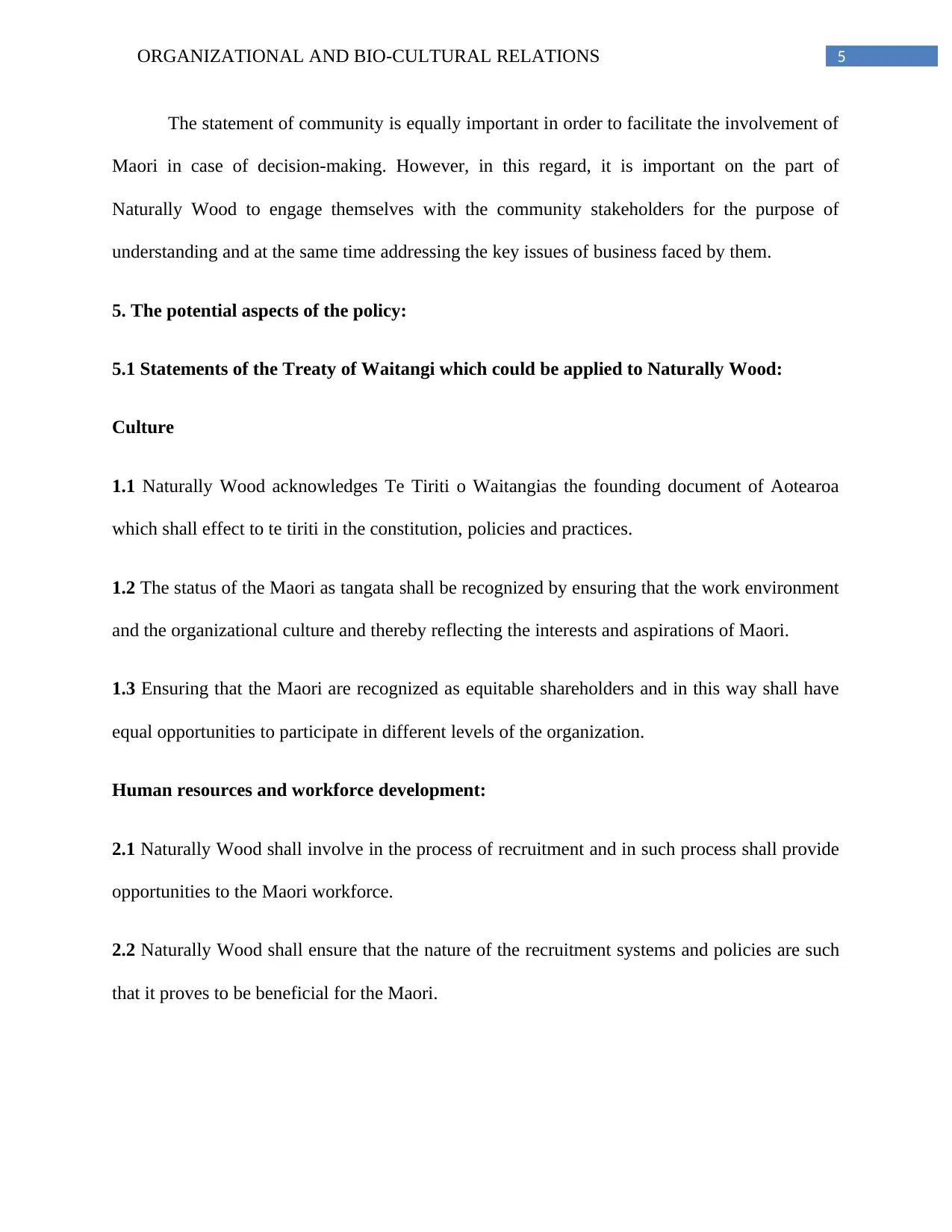
5ORGANIZATIONAL AND BIO-CULTURAL RELATIONS
The statement of community is equally important in order to facilitate the involvement of
Maori in case of decision-making. However, in this regard, it is important on the part of
Naturally Wood to engage themselves with the community stakeholders for the purpose of
understanding and at the same time addressing the key issues of business faced by them.
5. The potential aspects of the policy:
5.1 Statements of the Treaty of Waitangi which could be applied to Naturally Wood:
Culture
1.1 Naturally Wood acknowledges Te Tiriti o Waitangias the founding document of Aotearoa
which shall effect to te tiriti in the constitution, policies and practices.
1.2 The status of the Maori as tangata shall be recognized by ensuring that the work environment
and the organizational culture and thereby reflecting the interests and aspirations of Maori.
1.3 Ensuring that the Maori are recognized as equitable shareholders and in this way shall have
equal opportunities to participate in different levels of the organization.
Human resources and workforce development:
2.1 Naturally Wood shall involve in the process of recruitment and in such process shall provide
opportunities to the Maori workforce.
2.2 Naturally Wood shall ensure that the nature of the recruitment systems and policies are such
that it proves to be beneficial for the Maori.
The statement of community is equally important in order to facilitate the involvement of
Maori in case of decision-making. However, in this regard, it is important on the part of
Naturally Wood to engage themselves with the community stakeholders for the purpose of
understanding and at the same time addressing the key issues of business faced by them.
5. The potential aspects of the policy:
5.1 Statements of the Treaty of Waitangi which could be applied to Naturally Wood:
Culture
1.1 Naturally Wood acknowledges Te Tiriti o Waitangias the founding document of Aotearoa
which shall effect to te tiriti in the constitution, policies and practices.
1.2 The status of the Maori as tangata shall be recognized by ensuring that the work environment
and the organizational culture and thereby reflecting the interests and aspirations of Maori.
1.3 Ensuring that the Maori are recognized as equitable shareholders and in this way shall have
equal opportunities to participate in different levels of the organization.
Human resources and workforce development:
2.1 Naturally Wood shall involve in the process of recruitment and in such process shall provide
opportunities to the Maori workforce.
2.2 Naturally Wood shall ensure that the nature of the recruitment systems and policies are such
that it proves to be beneficial for the Maori.
⊘ This is a preview!⊘
Do you want full access?
Subscribe today to unlock all pages.

Trusted by 1+ million students worldwide
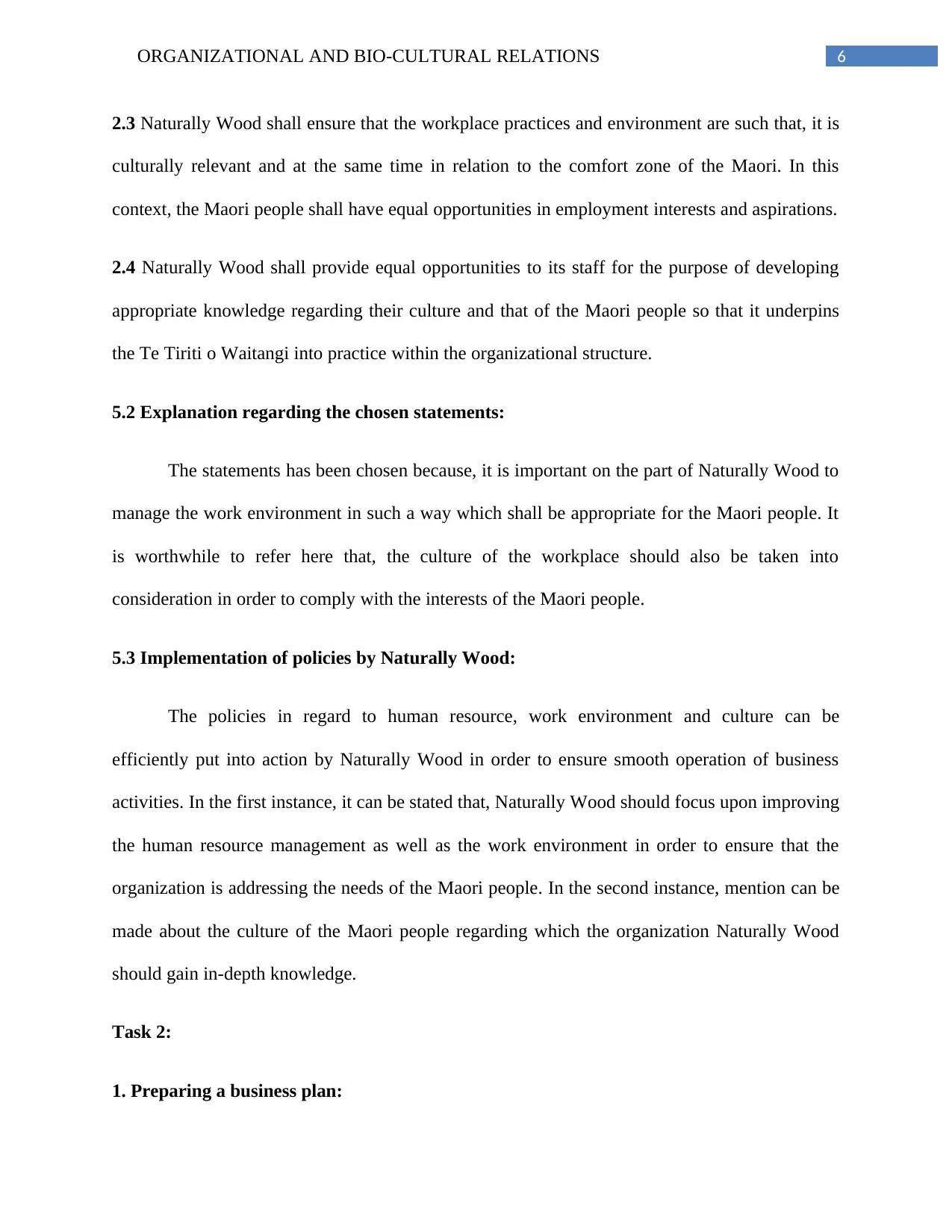
6ORGANIZATIONAL AND BIO-CULTURAL RELATIONS
2.3 Naturally Wood shall ensure that the workplace practices and environment are such that, it is
culturally relevant and at the same time in relation to the comfort zone of the Maori. In this
context, the Maori people shall have equal opportunities in employment interests and aspirations.
2.4 Naturally Wood shall provide equal opportunities to its staff for the purpose of developing
appropriate knowledge regarding their culture and that of the Maori people so that it underpins
the Te Tiriti o Waitangi into practice within the organizational structure.
5.2 Explanation regarding the chosen statements:
The statements has been chosen because, it is important on the part of Naturally Wood to
manage the work environment in such a way which shall be appropriate for the Maori people. It
is worthwhile to refer here that, the culture of the workplace should also be taken into
consideration in order to comply with the interests of the Maori people.
5.3 Implementation of policies by Naturally Wood:
The policies in regard to human resource, work environment and culture can be
efficiently put into action by Naturally Wood in order to ensure smooth operation of business
activities. In the first instance, it can be stated that, Naturally Wood should focus upon improving
the human resource management as well as the work environment in order to ensure that the
organization is addressing the needs of the Maori people. In the second instance, mention can be
made about the culture of the Maori people regarding which the organization Naturally Wood
should gain in-depth knowledge.
Task 2:
1. Preparing a business plan:
2.3 Naturally Wood shall ensure that the workplace practices and environment are such that, it is
culturally relevant and at the same time in relation to the comfort zone of the Maori. In this
context, the Maori people shall have equal opportunities in employment interests and aspirations.
2.4 Naturally Wood shall provide equal opportunities to its staff for the purpose of developing
appropriate knowledge regarding their culture and that of the Maori people so that it underpins
the Te Tiriti o Waitangi into practice within the organizational structure.
5.2 Explanation regarding the chosen statements:
The statements has been chosen because, it is important on the part of Naturally Wood to
manage the work environment in such a way which shall be appropriate for the Maori people. It
is worthwhile to refer here that, the culture of the workplace should also be taken into
consideration in order to comply with the interests of the Maori people.
5.3 Implementation of policies by Naturally Wood:
The policies in regard to human resource, work environment and culture can be
efficiently put into action by Naturally Wood in order to ensure smooth operation of business
activities. In the first instance, it can be stated that, Naturally Wood should focus upon improving
the human resource management as well as the work environment in order to ensure that the
organization is addressing the needs of the Maori people. In the second instance, mention can be
made about the culture of the Maori people regarding which the organization Naturally Wood
should gain in-depth knowledge.
Task 2:
1. Preparing a business plan:
Paraphrase This Document
Need a fresh take? Get an instant paraphrase of this document with our AI Paraphraser
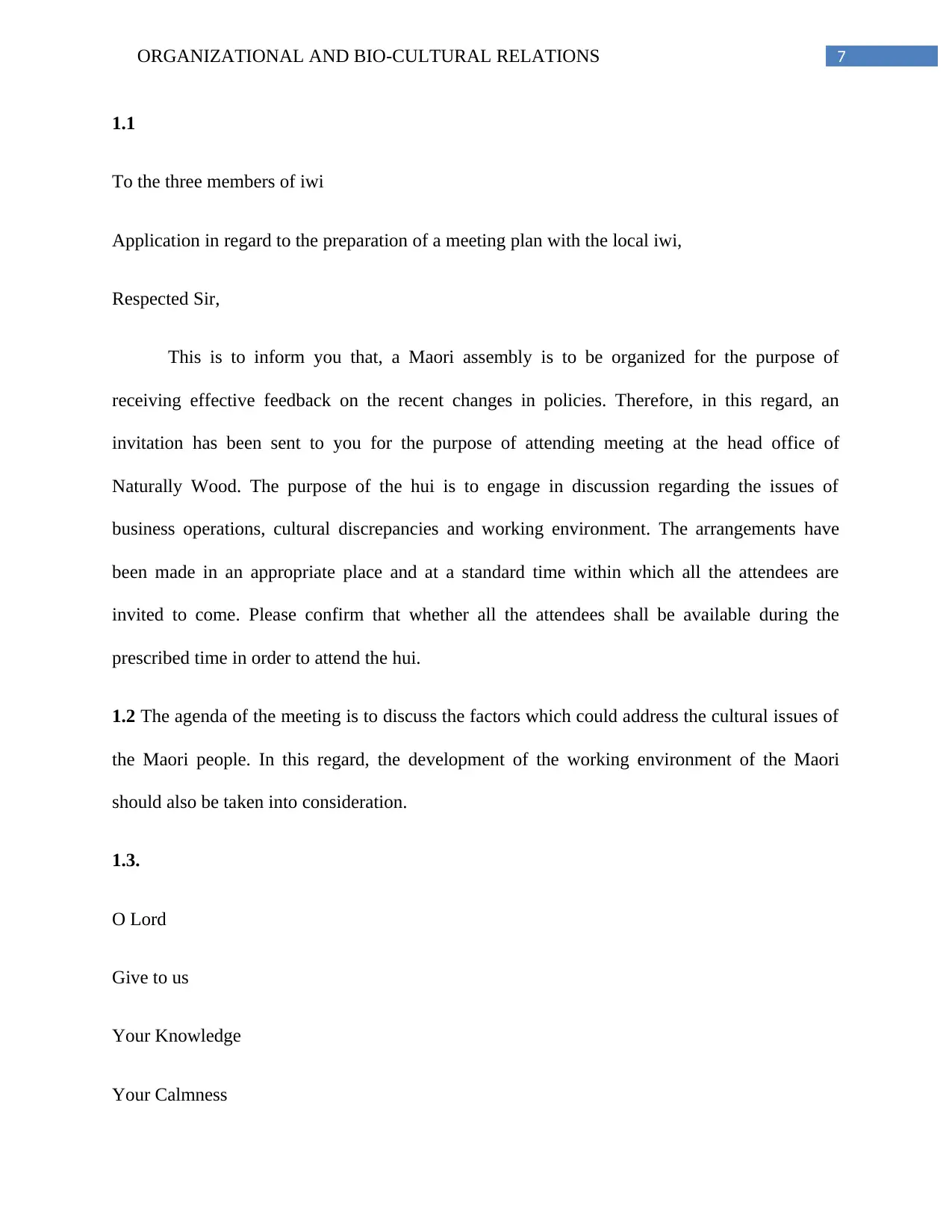
7ORGANIZATIONAL AND BIO-CULTURAL RELATIONS
1.1
To the three members of iwi
Application in regard to the preparation of a meeting plan with the local iwi,
Respected Sir,
This is to inform you that, a Maori assembly is to be organized for the purpose of
receiving effective feedback on the recent changes in policies. Therefore, in this regard, an
invitation has been sent to you for the purpose of attending meeting at the head office of
Naturally Wood. The purpose of the hui is to engage in discussion regarding the issues of
business operations, cultural discrepancies and working environment. The arrangements have
been made in an appropriate place and at a standard time within which all the attendees are
invited to come. Please confirm that whether all the attendees shall be available during the
prescribed time in order to attend the hui.
1.2 The agenda of the meeting is to discuss the factors which could address the cultural issues of
the Maori people. In this regard, the development of the working environment of the Maori
should also be taken into consideration.
1.3.
O Lord
Give to us
Your Knowledge
Your Calmness
1.1
To the three members of iwi
Application in regard to the preparation of a meeting plan with the local iwi,
Respected Sir,
This is to inform you that, a Maori assembly is to be organized for the purpose of
receiving effective feedback on the recent changes in policies. Therefore, in this regard, an
invitation has been sent to you for the purpose of attending meeting at the head office of
Naturally Wood. The purpose of the hui is to engage in discussion regarding the issues of
business operations, cultural discrepancies and working environment. The arrangements have
been made in an appropriate place and at a standard time within which all the attendees are
invited to come. Please confirm that whether all the attendees shall be available during the
prescribed time in order to attend the hui.
1.2 The agenda of the meeting is to discuss the factors which could address the cultural issues of
the Maori people. In this regard, the development of the working environment of the Maori
should also be taken into consideration.
1.3.
O Lord
Give to us
Your Knowledge
Your Calmness
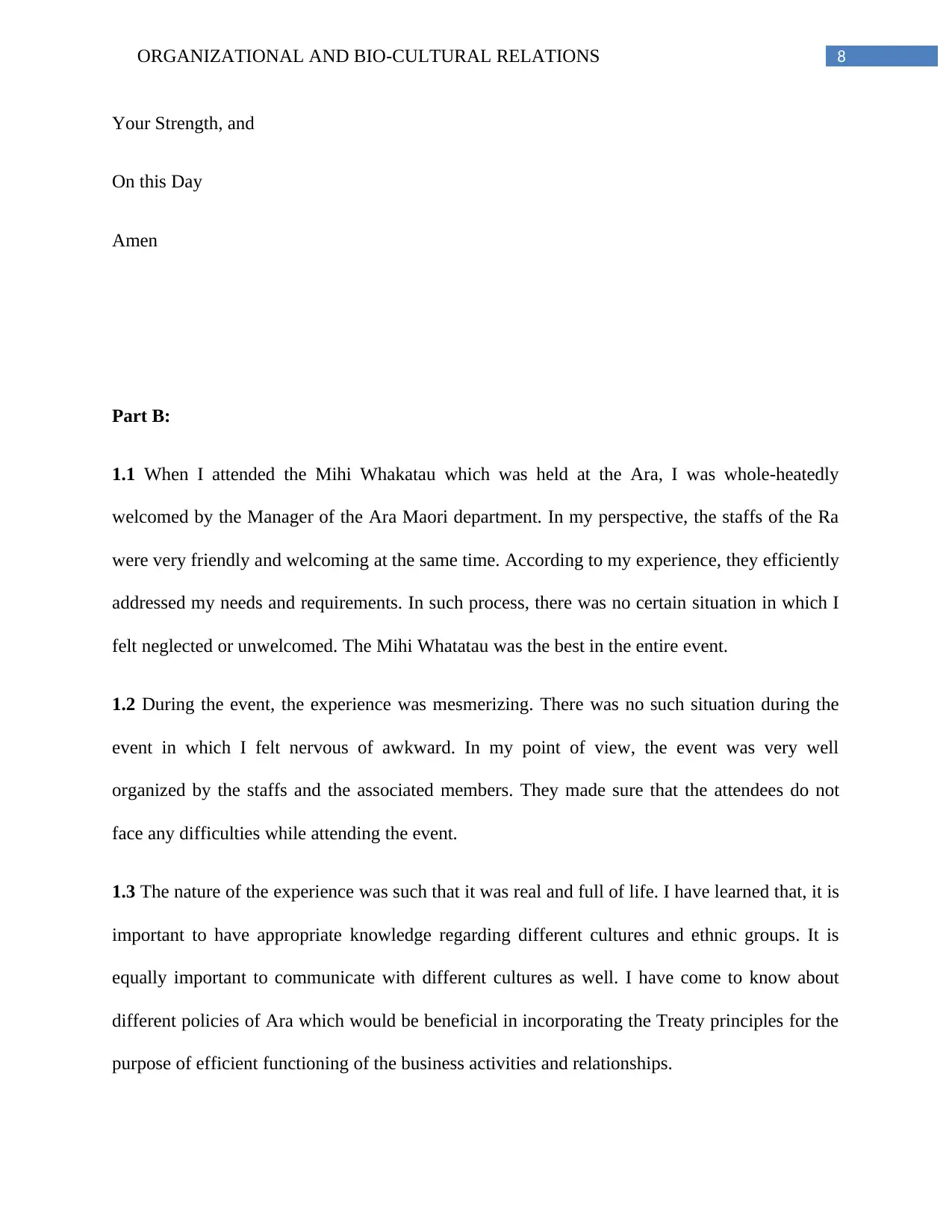
8ORGANIZATIONAL AND BIO-CULTURAL RELATIONS
Your Strength, and
On this Day
Amen
Part B:
1.1 When I attended the Mihi Whakatau which was held at the Ara, I was whole-heatedly
welcomed by the Manager of the Ara Maori department. In my perspective, the staffs of the Ra
were very friendly and welcoming at the same time. According to my experience, they efficiently
addressed my needs and requirements. In such process, there was no certain situation in which I
felt neglected or unwelcomed. The Mihi Whatatau was the best in the entire event.
1.2 During the event, the experience was mesmerizing. There was no such situation during the
event in which I felt nervous of awkward. In my point of view, the event was very well
organized by the staffs and the associated members. They made sure that the attendees do not
face any difficulties while attending the event.
1.3 The nature of the experience was such that it was real and full of life. I have learned that, it is
important to have appropriate knowledge regarding different cultures and ethnic groups. It is
equally important to communicate with different cultures as well. I have come to know about
different policies of Ara which would be beneficial in incorporating the Treaty principles for the
purpose of efficient functioning of the business activities and relationships.
Your Strength, and
On this Day
Amen
Part B:
1.1 When I attended the Mihi Whakatau which was held at the Ara, I was whole-heatedly
welcomed by the Manager of the Ara Maori department. In my perspective, the staffs of the Ra
were very friendly and welcoming at the same time. According to my experience, they efficiently
addressed my needs and requirements. In such process, there was no certain situation in which I
felt neglected or unwelcomed. The Mihi Whatatau was the best in the entire event.
1.2 During the event, the experience was mesmerizing. There was no such situation during the
event in which I felt nervous of awkward. In my point of view, the event was very well
organized by the staffs and the associated members. They made sure that the attendees do not
face any difficulties while attending the event.
1.3 The nature of the experience was such that it was real and full of life. I have learned that, it is
important to have appropriate knowledge regarding different cultures and ethnic groups. It is
equally important to communicate with different cultures as well. I have come to know about
different policies of Ara which would be beneficial in incorporating the Treaty principles for the
purpose of efficient functioning of the business activities and relationships.
⊘ This is a preview!⊘
Do you want full access?
Subscribe today to unlock all pages.

Trusted by 1+ million students worldwide
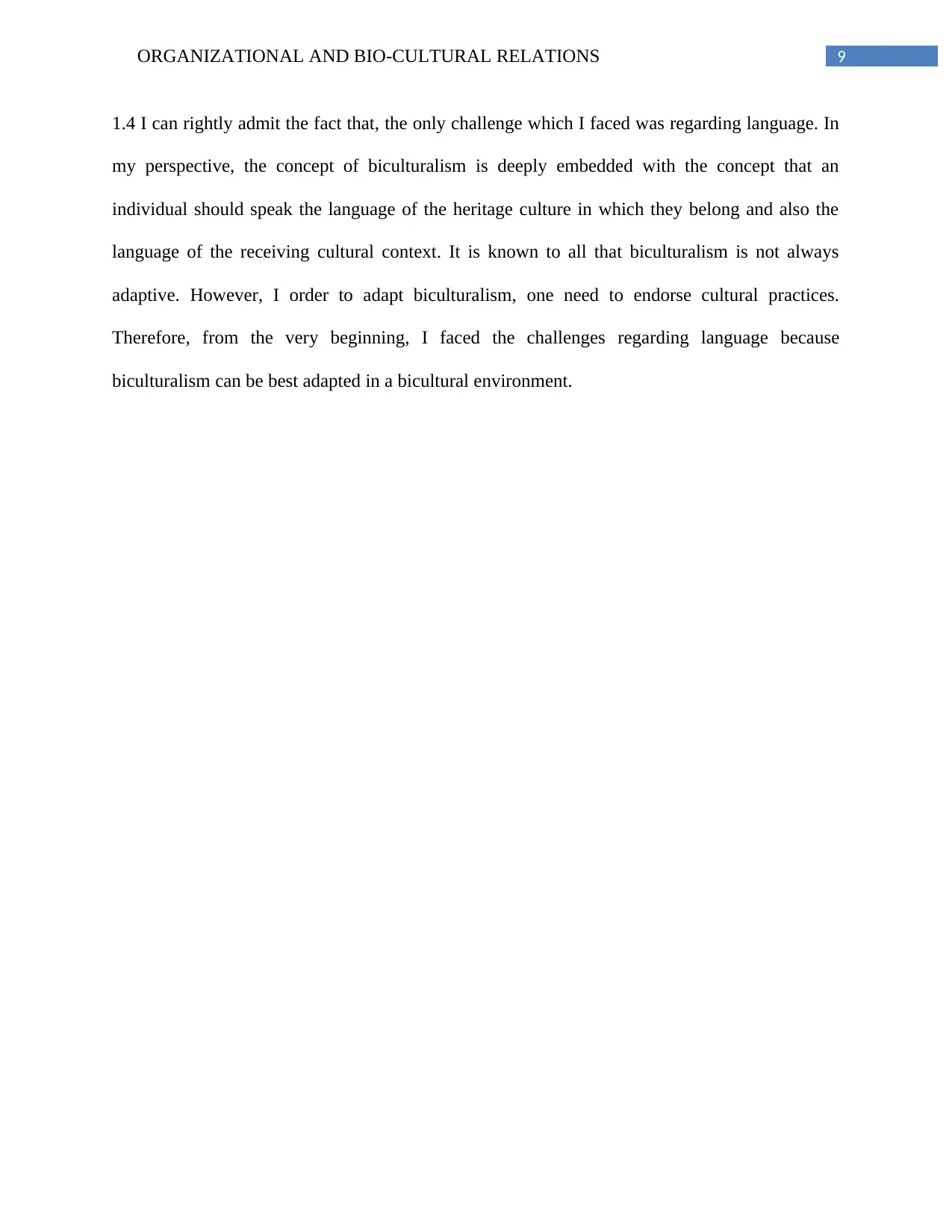
9ORGANIZATIONAL AND BIO-CULTURAL RELATIONS
1.4 I can rightly admit the fact that, the only challenge which I faced was regarding language. In
my perspective, the concept of biculturalism is deeply embedded with the concept that an
individual should speak the language of the heritage culture in which they belong and also the
language of the receiving cultural context. It is known to all that biculturalism is not always
adaptive. However, I order to adapt biculturalism, one need to endorse cultural practices.
Therefore, from the very beginning, I faced the challenges regarding language because
biculturalism can be best adapted in a bicultural environment.
1.4 I can rightly admit the fact that, the only challenge which I faced was regarding language. In
my perspective, the concept of biculturalism is deeply embedded with the concept that an
individual should speak the language of the heritage culture in which they belong and also the
language of the receiving cultural context. It is known to all that biculturalism is not always
adaptive. However, I order to adapt biculturalism, one need to endorse cultural practices.
Therefore, from the very beginning, I faced the challenges regarding language because
biculturalism can be best adapted in a bicultural environment.
Paraphrase This Document
Need a fresh take? Get an instant paraphrase of this document with our AI Paraphraser
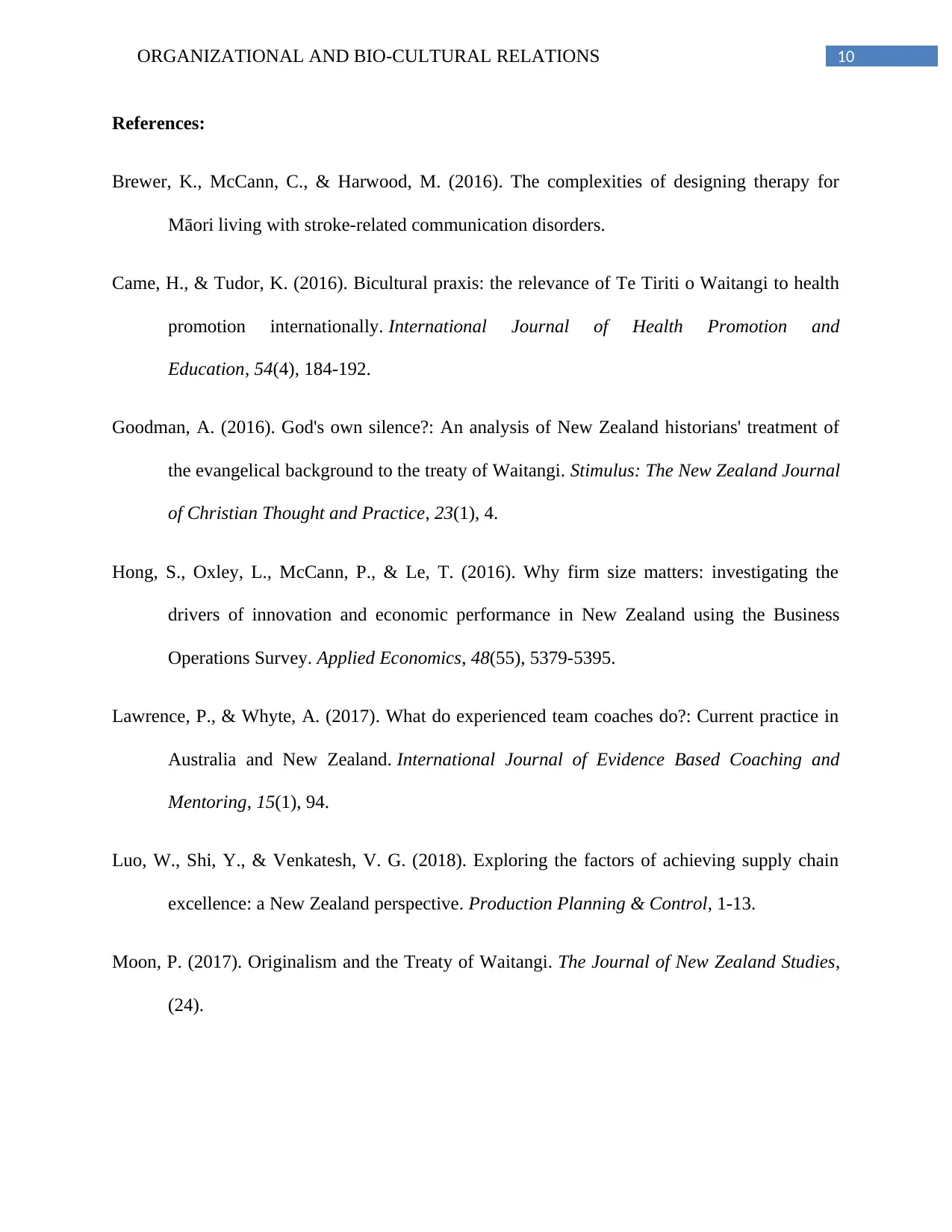
10ORGANIZATIONAL AND BIO-CULTURAL RELATIONS
References:
Brewer, K., McCann, C., & Harwood, M. (2016). The complexities of designing therapy for
Māori living with stroke-related communication disorders.
Came, H., & Tudor, K. (2016). Bicultural praxis: the relevance of Te Tiriti o Waitangi to health
promotion internationally. International Journal of Health Promotion and
Education, 54(4), 184-192.
Goodman, A. (2016). God's own silence?: An analysis of New Zealand historians' treatment of
the evangelical background to the treaty of Waitangi. Stimulus: The New Zealand Journal
of Christian Thought and Practice, 23(1), 4.
Hong, S., Oxley, L., McCann, P., & Le, T. (2016). Why firm size matters: investigating the
drivers of innovation and economic performance in New Zealand using the Business
Operations Survey. Applied Economics, 48(55), 5379-5395.
Lawrence, P., & Whyte, A. (2017). What do experienced team coaches do?: Current practice in
Australia and New Zealand. International Journal of Evidence Based Coaching and
Mentoring, 15(1), 94.
Luo, W., Shi, Y., & Venkatesh, V. G. (2018). Exploring the factors of achieving supply chain
excellence: a New Zealand perspective. Production Planning & Control, 1-13.
Moon, P. (2017). Originalism and the Treaty of Waitangi. The Journal of New Zealand Studies,
(24).
References:
Brewer, K., McCann, C., & Harwood, M. (2016). The complexities of designing therapy for
Māori living with stroke-related communication disorders.
Came, H., & Tudor, K. (2016). Bicultural praxis: the relevance of Te Tiriti o Waitangi to health
promotion internationally. International Journal of Health Promotion and
Education, 54(4), 184-192.
Goodman, A. (2016). God's own silence?: An analysis of New Zealand historians' treatment of
the evangelical background to the treaty of Waitangi. Stimulus: The New Zealand Journal
of Christian Thought and Practice, 23(1), 4.
Hong, S., Oxley, L., McCann, P., & Le, T. (2016). Why firm size matters: investigating the
drivers of innovation and economic performance in New Zealand using the Business
Operations Survey. Applied Economics, 48(55), 5379-5395.
Lawrence, P., & Whyte, A. (2017). What do experienced team coaches do?: Current practice in
Australia and New Zealand. International Journal of Evidence Based Coaching and
Mentoring, 15(1), 94.
Luo, W., Shi, Y., & Venkatesh, V. G. (2018). Exploring the factors of achieving supply chain
excellence: a New Zealand perspective. Production Planning & Control, 1-13.
Moon, P. (2017). Originalism and the Treaty of Waitangi. The Journal of New Zealand Studies,
(24).
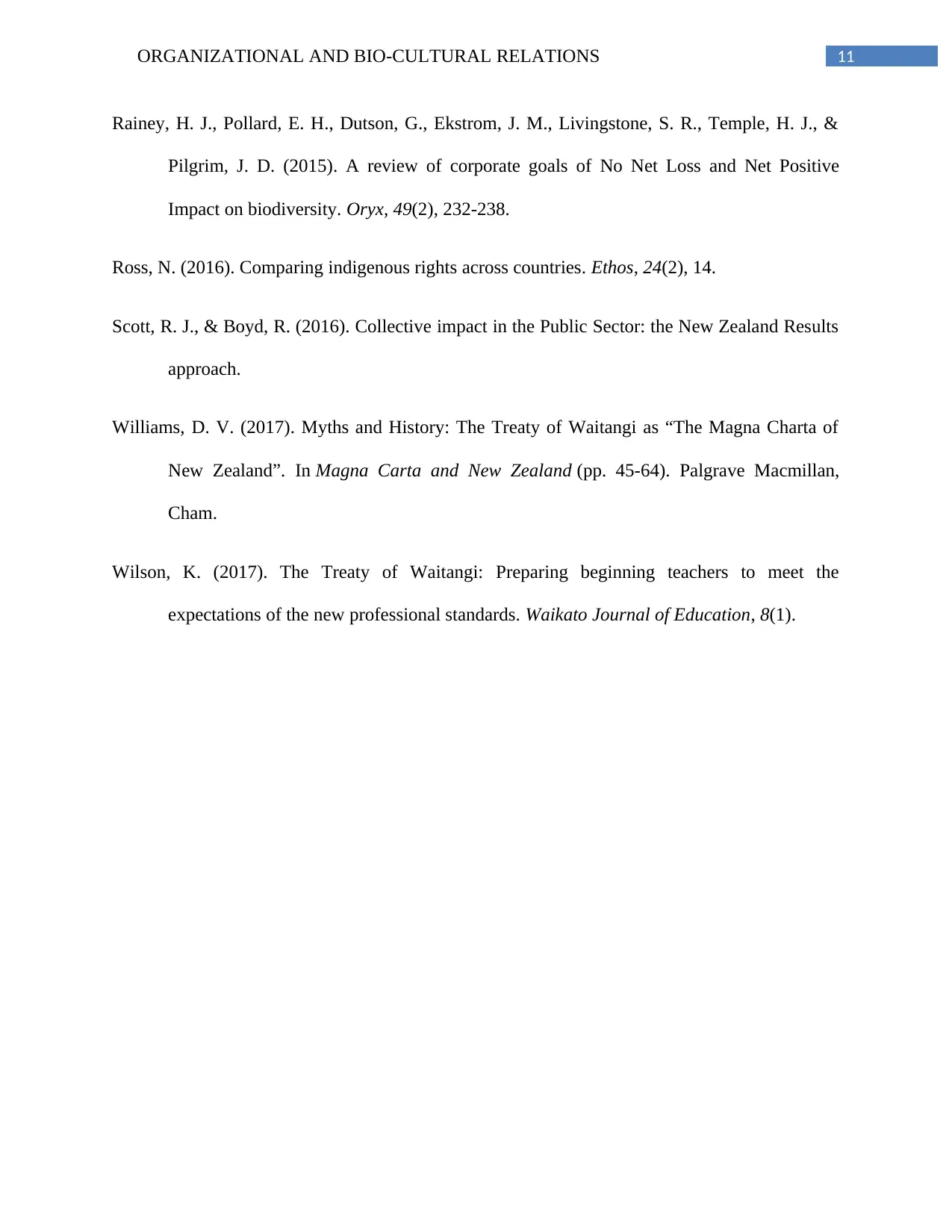
11ORGANIZATIONAL AND BIO-CULTURAL RELATIONS
Rainey, H. J., Pollard, E. H., Dutson, G., Ekstrom, J. M., Livingstone, S. R., Temple, H. J., &
Pilgrim, J. D. (2015). A review of corporate goals of No Net Loss and Net Positive
Impact on biodiversity. Oryx, 49(2), 232-238.
Ross, N. (2016). Comparing indigenous rights across countries. Ethos, 24(2), 14.
Scott, R. J., & Boyd, R. (2016). Collective impact in the Public Sector: the New Zealand Results
approach.
Williams, D. V. (2017). Myths and History: The Treaty of Waitangi as “The Magna Charta of
New Zealand”. In Magna Carta and New Zealand (pp. 45-64). Palgrave Macmillan,
Cham.
Wilson, K. (2017). The Treaty of Waitangi: Preparing beginning teachers to meet the
expectations of the new professional standards. Waikato Journal of Education, 8(1).
Rainey, H. J., Pollard, E. H., Dutson, G., Ekstrom, J. M., Livingstone, S. R., Temple, H. J., &
Pilgrim, J. D. (2015). A review of corporate goals of No Net Loss and Net Positive
Impact on biodiversity. Oryx, 49(2), 232-238.
Ross, N. (2016). Comparing indigenous rights across countries. Ethos, 24(2), 14.
Scott, R. J., & Boyd, R. (2016). Collective impact in the Public Sector: the New Zealand Results
approach.
Williams, D. V. (2017). Myths and History: The Treaty of Waitangi as “The Magna Charta of
New Zealand”. In Magna Carta and New Zealand (pp. 45-64). Palgrave Macmillan,
Cham.
Wilson, K. (2017). The Treaty of Waitangi: Preparing beginning teachers to meet the
expectations of the new professional standards. Waikato Journal of Education, 8(1).
⊘ This is a preview!⊘
Do you want full access?
Subscribe today to unlock all pages.

Trusted by 1+ million students worldwide
1 out of 12
Your All-in-One AI-Powered Toolkit for Academic Success.
+13062052269
info@desklib.com
Available 24*7 on WhatsApp / Email
![[object Object]](/_next/static/media/star-bottom.7253800d.svg)
Unlock your academic potential
Copyright © 2020–2026 A2Z Services. All Rights Reserved. Developed and managed by ZUCOL.
